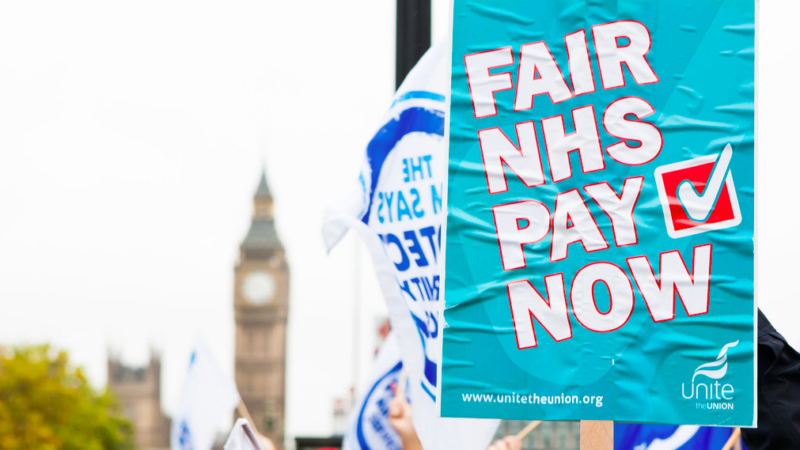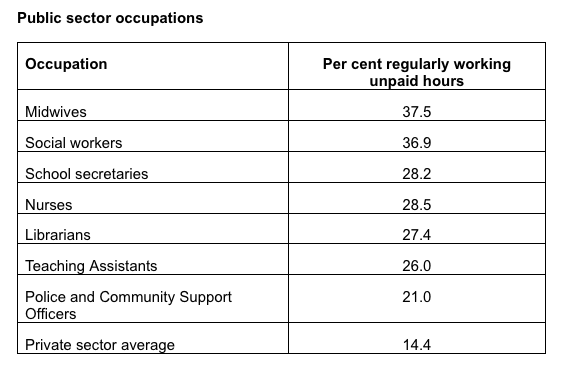A quarter of public sector staff do on average eight hours of unpaid work a week, shocking new GMB report reveals.

Nearly 2 million public sector workers are doing £11bn worth of unpaid overtime every year, the GMB union revealed today.
A quarter of public sector staff do on average eight hours of unpaid work a week, analysis of official figures showed, whilst at least one in twenty worked at least 15 extra, unpaid, hours a week.
Midwives and social workers are doing the most unpaid overtime, the report showed, with 37.5 per cent of midwives and 37 per cent of social workers putting in extra hours.
If public sector workers were paid for these hours, they would be owed an extra £6,000 on average – equivalent to a 24 per cent pay rise – the report said.
“Ministers think they can push staff indefinitely, but low pay, unmanageable workloads and stress are pushing many of our members to the limit.”
Said Rehana Azam, GMB National Secretary for Public Services.
“Public sector workers are the backbone of our society – working above and beyond their contracted hours because they are committed to jobs they love”, Azam added.
Overall, public sector workers are twice as likely to work unpaid overtime than their private sector counterparts.
The GMB warned that the levels of extra hours worked were ‘dangerous’.
The rise in unpaid overtime follows cuts of 412,000 public sector jobs since 2010 and an increased demand for public services.
“Philip Hammond says that public sector workers are ‘overpaid’ but these shocking new figures show just how out of touch he is,” said Azam.
“The reality is that public services are held together by the devotion of overworked and underappreciated employees, who are effectively handing the Government £11 billion worth of their labour for free.”
Azam added.
“Enough is enough – it’s time to tackle ever rising workloads and give our public sector workers the real pay rises they desperately need and deserve.”





3 Responses to “Public sector workers do £11bn of unpaid overtime every year”
patrick newman
To suggest that public sector staff are overpaid is both contemptible and insulting. Not mentioned above is the teaching profession where it is certainly not unusual for primary school teachers work a 60 hour week with no extra pay. Most schools and many public services are operating illegally in terms of hours. On the other hand these workers do not make use of the fact that many public services are dependent on unpaid overtime which could be a source of power in breaking the 1% cap. Instead of the traditional annual one day strike to back a pay claim these workers could simply work to hours and work to rule and work to contract. This would be particularly effective in schools which would be struggling to function under such action. It would also be very effective in many other areas of the public sector. May be the FDA could consider something similar with senior civil servants working on Brexit?
keith
Working as a carer for the local authority, my co-workers and myself are regularly late finishing work because of the needs of the service and are offered time owing in lieu which is impossible to take back because of the under staffing and the needs of the service.
Vicious circle syndrome. Staff are often on sick leave because of the stress and the other staff have no life outside of work because of the cover they provide and sheer exhaustion.
All this without a mention of the seven years of austerity.
I quite agree with a work to rule which would prevent a loss of earnings to an already underpaid and undervalued staff, while at the same time highlighting just how much unpaid work public servants carry out.
Enough is enough.
Lorraine Surringer
Teachers should be top of the list! When I was teaching on a long term contract I was doing over 30 hours of marking a week as an English teacher – almost a full time job in itself! Hats off to all diligent teachers who do this for many years!